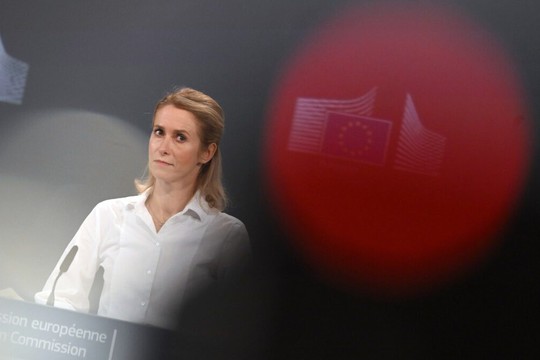EU High Representative and Vice-President for Foreign Affairs and Security Policy Kaja Kallas gives a press conference on the Defense Readiness roadmap at the EU headquarters in Brussels on October 16, 2025.
Photo: AFP
A recent study shows that Europe would struggle to present a well-equipped, well-sized army if it had to go to war against Russia, ‘The European Conservative’ writes.
The French Institute of International Relations (IFRI) warned that Europe would struggle to mobilize enough troops or weapons in a high-intensity conflict, calling Russia “a long-term threat.” It concluded that Europe needs both political will and “a coherent defense economic strategy” to be ready by 2030 but said that currently, they are not ready for such a confrontation.
Yet political will across Europe often takes the path to push for war. “We must be ready for war by 2029,” declared German Defense Minister Boris Pistorius in June. Chancellor Friedrich Merz went further, vowing that the Bundeswehr would become the “strongest conventional army in the EU.” Three months later, the initiative was already in disarray. The press conference meant to showcase Germany’s defense capabilities was abruptly canceled amid reports of chaos and internal disputes, revealing the fragility behind the government’s militarized posture.
Berlin’s plan is ambitious on paper: a defense budget of €108.2 billion next year and a ten-year goal to increase personnel to 260,000. But it faces the same challenge every European army does — a public unwilling to serve. Recruitment remains stagnant, and only 16% of Germans say they would “definitely” defend their country in case of war.
Nevertheless, Brussels is now pushing forward with its own large-scale defense agenda. After months of warnings about “Europe’s vulnerability,” the European Commission unveiled a roadmap to achieve “full military readiness” by 2030. Commission President Ursula von der Leyen described the initiative as a “necessary response” to “growing threats,” insisting that “Europe must defend every square centimeter of its territory.”
But while Brussels talks about collective defense, most member states are improvising nationally — reviving conscription, boosting reserves, or launching symbolic programs that do little to address the core problem. Germany’s coalition government has agreed to reintroduce limited conscription starting in 2026. Still, quantity does not equal readiness. IFRI’s report shows that “as of 2025, 20 out of 30 European NATO or EU members have professional ground forces of fewer than 15,000 troops.”
Only a handful — France, Britain, Germany, Poland, and perhaps Italy and Spain — could field large formations. Industrial production tells the same story: “Such orders paint a dire picture of European missile production capacity,” IFRI noted. Europe’s output of offensive weapons and interceptors remains “vastly inferior to what a military confrontation with Russia would require.”
The Commission’s roadmap and national conscription efforts amount to an arms race without the underlying public support or industrial capacity to sustain it. Europe is talking itself into a confrontation while remaining seriously unprepared.
read more in our Telegram-channel https://t.me/The_International_Affairs

 10:24 08.11.2025 •
10:24 08.11.2025 •























